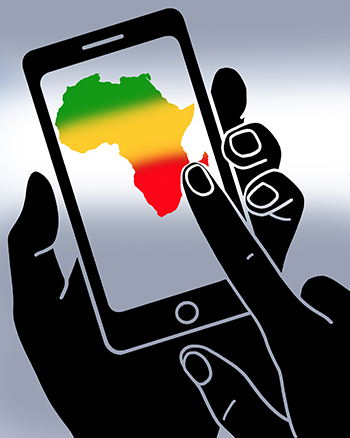
If you’ve read Chimamanda Ngozi Adichie’s novel Americanah, you know that her heroine, Ifemelu, uses satirical blog posts to comment on her experiences at home and abroad. Or you may have noticed that Adichie’s TED Talk “We Should All Be Feminists” has been repackaged by everyone from Beyoncé to fashion designer Maria Grazia Chiuri. Ifemelu and her creator, Adichie, are not the only African writers making names for themselves in cyberspace. My course “Digital Africas” explores the myriad ways in which widespread access to smartphones in Africa has changed how writers circulate their work and how African readers access it. Online media in Africa are abuzz with new writing, some in English, some mixing English with African languages and hybrid forms.
Literary Journals
Chimurenga (chimurenga.co.za, South Africa), Jalada (jaladaafrica.org, Kenya) and Saraba (sarabamag.com, Nigeria) lead the pack, carrying everything from flash fiction to essays about sexting. A Jalada story in Kikuyu by the Kenyan writer Ngugi wa Thiong’o has been translated into 60 languages, 40 of which are African, and translations still flow to the journal’s website. New online literary publications seem to spring up every month. One of the most sophisticated, Enkare (enkare.org), is co-edited by Alexis Teyie ’16, now back home in Nairobi. It has snagged contributions from Junot Díaz and Taiye Selasi while also offering a platform to new writers.
Serialized Novels
In southern Africa, online serialized stories are the rage. Mike Maphoto’s Diary of a Zulu Girl (diaryofazulugirl.co.za) boasted 17 million readers at the peak of its popularity. Maphoto now employs a stable of writers to keep churning out his sensationalized page-turners. Copycat stories, like Diary of a Single Mum (by Juniah Ngwira, Malawi) and Diary of a Cheating Husband (by Thulani Lupondwana, South Africa), are published on Facebook and boast thousands of loyal followers.
Poetry and Essays
Work by African writers has found a continental and international audience via social media. When Binyavanga Wainaina came out in response to repressive new anti-gay laws in Nigeria and Uganda, his essay “I Am a Homosexual, Mum,” published on Africasacountry.com and Chimurenga.co.za, triggered a cascade of stories, essays and poems about LGBTQ Africans. Some are featured in online journals like Brittle Paper (brittlepaper.com). The ICC Witness Project (iccwitnesses.tumblr.com), a chain of anonymous poems, gives voices to the witnesses who were disappeared before they could testify at the International Criminal Court about the violence surrounding the 2007 Kenyan elections.
Science Fiction
The online appetite for science fiction among African readers has boosted print work in the genre. The moment when aliens and traditional spirits join forces in Nnedi Okorafor’s Lagoon (Simon & Schuster, 2015) to declare, “We are the internet,” exudes all the otherworldly frisson of Darth Vader announcing to Luke Skywalker, “I am your father.” A. Igoni Barrett’s Blackass (Graywolf Press, 2016), about a black Yoruba man who wakes up white, combines the world-altering conventions of science fiction with the roman à clef. In it, a writer, also called Igoni, spends a lot of time on his computer trying to work out his relationship to the racially altered protagonist.
Video and Photography
Kenyan photographers and poets created the Koroga project (koroga-blog-blog.tumblr.com), which produced chains of poems triggered by photos triggered by poems. After making the first African music video to go viral, Jim Chuchu made exquisite film loops foregrounding the male body, as a way to talk back to a society that has not embraced his films about the LGBTQ community as eagerly as it celebrated Makmende, the Blaxploitation hero of his viral video. And Ghanaian satiric duo Fokn Bois, which started out posting music videos and spoken-word poems on YouTube, has now graduated to full-length folk operas shot entirely with smartphones.